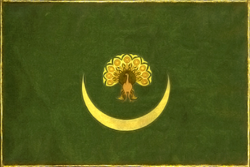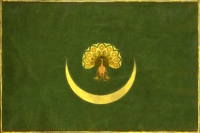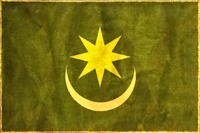Difference between revisions of "Mughal Empire (ETW Faction)"
CoconutFred (talk | contribs) |
m (Added republic flag) |
||
| (18 intermediate revisions by 6 users not shown) | |||
| Line 1: | Line 1: | ||
| − | {{Faction|image=[[ | + | {{Faction|image=[[File:MughalEmpire_FlagETW.png|250px]]|Name=Mughal Empire|Game=[[Empire: Total War]]|Religion=[[Islam (ETW Religion)|Islam]]|Culture=Indian}} |
| + | The '''Mughal Empire''' is one of 13 nations considered to be Major Factions in ''[[Empire: Total War]]''. It is the only major faction that is unplayable in Empire: Total War, although it actually has campaign loss videos and a description. The game can be modded to unlock the Mughal Empire in the Grand Campaign. | ||
| + | |||
==Overview== | ==Overview== | ||
| − | + | [[File:MughalEmpire_FlagETW.png|200px|Monarchy]] [[File:MughalEmpireAlternate FlagETW.png|200px|Republic]] | |
| + | |||
| + | Mughal power is mighty indeed, as befits the children of Genghis Khan and his Mongol hordes. Their Indian empire has stood the test of time, and is possibly the wealthiest state in the whole world. | ||
| + | |||
| + | While the Mughal emperors are the descendants of Genghis Khan, their history has changed them. Now Muslim rather than pagan, they have also absorbed much of the language and high culture of Persia. Once India was conquered, they adopted much that is good from the local culture: the result is a rich and heady mixture of Indian, Persian and Mongol that produces an empire that is distinctive and Indian, both in the way it is run and the way it fights wars. | ||
| + | |||
| + | The Mughals are secure within their borders, although those borders are so extensive that even “local” problems can involve vast numbers of people. Their armies are, in poetic terms, numberless, and their power cannot be easily measured. Should he wish it, a Mughal ruler need only lift his finger to lay waste his enemies by the thousand. But why should he wish it? Why should he not? | ||
| + | |||
| + | There are potential problems, however. The ambitions of the Europeans may need to be checked, sooner or later. They seek power in India without any real understanding of what that means. They seek concessions, and land, and more concessions. At some point, a line must be drawn – or better still, a Mughal should make demands of a European, in Europe… | ||
==Starting Position== | ==Starting Position== | ||
| + | |||
| + | The Mughals begin the game controlling almost the entirety of the resource-laden Indian subcontinent. However, it recruits very slowly and has barely any troops in any of its regions, essentially reducing it to a very lucrative target for any faction that can reach it. The Mughal Empire is usually annexed by the Maratha Confederacy eventually. A notable early weakness within Mughal lands is the lack of development in most of its regions. Starting off the game with horrendous ministers, (most notable is the treasury) it is nothing to see a region in the middle of India having a wealth of zero when playing as the Maratha Confederacy. | ||
===Basics at start=== | ===Basics at start=== | ||
| Line 140: | Line 152: | ||
Plantations – Khandwa Plantations (Not Developed) | Plantations – Khandwa Plantations (Not Developed) | ||
| − | [[ | + | ==Units== |
| + | |||
| + | ==Cavalry== | ||
| + | *[[Native Lancers (ETW Unit)|Native Lancers]] | ||
| + | |||
| + | *[[Qizilbashi Cavalry (ETW Unit)|Qizilbashi Cavalry]] | ||
| + | |||
| + | *[[Zamindari Horsemen (ETW Unit)|Zamindari Horsemen]] | ||
| + | |||
| + | ==Infantry== | ||
| + | *[[Armed Populace (ETW Unit)|Armed Populace]] | ||
| + | *[[Firelock Armed Populace (ETW Unit)|Firelock Armed Populace]] | ||
| + | *[[Armed Peasantry (ETW Unit)|Armed Peasantry]] | ||
| + | *[[Desert Warriors (ETW Unit)|Desert Warriors]] | ||
| + | *[[Bhumiya Bowmen (ETW Unit)|Bhumiya Bowmen]] | ||
| + | *[[Musketmen (ETW Unit)|Musketmen]] | ||
| + | *[[Hindu Musketeers (ETW Unit)|Hindu Musketeers]] | ||
| + | *[[Afghan Hillmen (ETW Unit)|Afghan Hillmen]] | ||
| + | *[[Qizilbashi Musketeers (ETW Unit)|Qizilbashi Musketeers]] | ||
| + | |||
{{ETW Factions}} | {{ETW Factions}} | ||
| + | |||
| + | [[Category:ETW Factions]] | ||
Latest revision as of 08:16, 13 July 2020
| Mughal Empire (ETW Faction) | |
|---|---|
 | |
| Name: | Mughal Empire |
| From Game: | Empire: Total War |
| Religion: | Islam |
| Culture: | Indian |
| Playable: | |
The Mughal Empire is one of 13 nations considered to be Major Factions in Empire: Total War. It is the only major faction that is unplayable in Empire: Total War, although it actually has campaign loss videos and a description. The game can be modded to unlock the Mughal Empire in the Grand Campaign.
Contents
- 1 Overview
- 2 Starting Position
- 2.1 Basics at start
- 2.1.1 India Theatre
- 2.1.1.1 Akbarabad, Hindustan
- 2.1.1.2 Hyderabad, Hyderabad
- 2.1.1.3 Calcutta, Bengal
- 2.1.1.4 Ahmedabad, Gujarat
- 2.1.1.5 Lahore, Punjab
- 2.1.1.6 Nagpur, Berar
- 2.1.1.7 Cuttack, Orissa & Circars
- 2.1.1.8 Neroon Kot, Sindh
- 2.1.1.9 Udaipur, Rajpootana
- 2.1.1.10 Ahmadnagar, Ahmadnagar
- 2.1.1.11 Srinagar, Kashmir
- 2.1.1.12 Ujjain, Malwa
- 2.1.1 India Theatre
- 2.1 Basics at start
- 3 Units
- 4 Cavalry
- 5 Infantry
Overview
Mughal power is mighty indeed, as befits the children of Genghis Khan and his Mongol hordes. Their Indian empire has stood the test of time, and is possibly the wealthiest state in the whole world.
While the Mughal emperors are the descendants of Genghis Khan, their history has changed them. Now Muslim rather than pagan, they have also absorbed much of the language and high culture of Persia. Once India was conquered, they adopted much that is good from the local culture: the result is a rich and heady mixture of Indian, Persian and Mongol that produces an empire that is distinctive and Indian, both in the way it is run and the way it fights wars.
The Mughals are secure within their borders, although those borders are so extensive that even “local” problems can involve vast numbers of people. Their armies are, in poetic terms, numberless, and their power cannot be easily measured. Should he wish it, a Mughal ruler need only lift his finger to lay waste his enemies by the thousand. But why should he wish it? Why should he not?
There are potential problems, however. The ambitions of the Europeans may need to be checked, sooner or later. They seek power in India without any real understanding of what that means. They seek concessions, and land, and more concessions. At some point, a line must be drawn – or better still, a Mughal should make demands of a European, in Europe…
Starting Position
The Mughals begin the game controlling almost the entirety of the resource-laden Indian subcontinent. However, it recruits very slowly and has barely any troops in any of its regions, essentially reducing it to a very lucrative target for any faction that can reach it. The Mughal Empire is usually annexed by the Maratha Confederacy eventually. A notable early weakness within Mughal lands is the lack of development in most of its regions. Starting off the game with horrendous ministers, (most notable is the treasury) it is nothing to see a region in the middle of India having a wealth of zero when playing as the Maratha Confederacy.
Basics at start
- Protectorates – None
- Allies – None
- Trade Partners – Persia, United Provinces, Ottoman Empire, Mysore, Portugal
- Enemies – Pirates, Maratha Confederacy
- Religion – Islam
- Government – Absolute Monarchy
- Ruler – Aurangzeb I (Sultan)
- Population – 62,459,352
- Prosperity – Affluent
- Prestige – Feeble
- Treasury –9000
- Technology – None
- Imams – Firuz Shafi (Berar), Afzal Panni (Rajpootana)
- Thugees – Alam Rathor (Berar), Baharji Bakhsh (Gujarat)
- Scholars – Mohinder Shafi (Hindustan), Sikandar Borah (Hindustan)
India Theatre
Akbarabad, Hindustan
Starting Buildings – Provincial Barracks, Ordnance Factory, Nautch Dancing School, Settlement Fortifications Infrastructure - Basic Roads Population – 14,138,433 Wealth – 1911 Religion – Islam 35.0%, Hinduism 60.0%, Buddhism 5.0% Starting Towns/Ports – Aligarh Wetlands (Not Developed), Bhiwani Farmland (Peasant Farms), Bansdih Wetlands (Not Developed), Gwalior (Tavern), Benares (School), Sitapur (Craft Workshops Weavers), Delhi (Craft Workshops Weavers) Later Villages/Ports – Gorakphur (Village) Plantations – Srinagar Plantations (Not Developed), Najibabad (Small Sugar Plantation)
Hyderabad, Hyderabad
Starting Buildings – Cannon Foundry, Thakur’s Mansion, Settlement Fortifications Infrastructure - Basic Roads Population – 416,390 Wealth – 764 Religion – Islam 30.0%, Hinduism 70.0% Starting Towns/Ports – Mancheral Wetlands (Not Developed), Suriapet Farmlands (Peasant Farms) Later Villages/Ports – Golconda (Village), Nizamabad (Village), Kurnool (Village) Plantations – Bhainsa Plantations (Small Tea Plantation)
Calcutta, Bengal
Starting Buildings – Provincial Barracks, Thakur’s Court, Nautch Dancing School Infrastructure – Not Developed Population – 23,601,307 Wealth – 373 Religion – Islam 20.0%, Hinduism 50.0%, Buddhism 30.0% Starting Towns/Ports – Saharsa Wetlands (Rice Paddies), Rajshahi Wetlands (Not Developed), Bhagalpur (Tavern), Port of Calcutta (Trading Port) Later Villages/Ports – Patna (Village), Dacca (Village) Plantations – Assam Plantations (Not Developed), Daulatpur Plantations (Small Spice Plantation)
Ahmedabad, Gujarat
Starting Building – Provincial Barracks, Thakur’s Court Infrastructure – Not Developed Population – 793,180 Wealth – 450 Religion – Islam 30.0%, Hinduism 70.0% Starting Towns/Ports – Rajkot Farmland (Peasant Farms), Surat (Trading Port) Later Villages/Ports –Baroda (Village), Porbandar (Port) Plantations – Shahada Plantations (Not Developed)
Lahore, Punjab
Starting Building – Provincial Barracks, Zamindar’s Court, Nautch Dancing School Infrastructure – Basic Roads Population – 939,802 Wealth – 3050 Religion – Islam 30.0%, Sikh 45.0%, Hinduism 25.0% Starting Towns/Ports – Jehlum Mines (Iron Mine), Sargodha Wetlands (Rice Paddies), Kandhkot Mines (Gold Mine), Kandhkot Farmland (Not Developed), Khanpur (Tavern), Kasur (Small Madrassa) Later Villages/Ports – Rawalpindi (Village), Multan (Village)
Nagpur, Berar
Starting Buildings – Zamidar’s Court Infrastructure – Not Developed Population – 2,033,820 Wealth – 125 Religion – Islam 40.0%, Hinduism 60.0% Starting Towns/Ports – Chakradharpur Mines (Not Developed), Bilaspur Wetlands (Rice Paddies) Later Villages/Ports – Chanda (Village), Raipur (Village) Plantations – Tadoba Plantations (Not Developed)
Cuttack, Orissa & Circars
Starting Buildings – Zamidar’s Court Infrastructure – Not Developed Population – 1,019,281 Wealth – 2075 Religion – Islam 40.0%, Hinduism 60.0% Starting Towns/Ports – Kendrapara Wetlands (Rice Paddies), Balangir Wetlands (Rice Paddies), Rourkela Mines (Iron Mine), Sambalpur (Craft Workshops Smiths) Later Villages/Ports – Vizianagram (Village), Puri (Port), Yanaon (Port), Masulipatnam (Village)
Neroon Kot, Sindh
Starting Buildings – Zamidar’s Court Infrastructure – Not Developed Population – 1,206,684 Wealth – 150 Religion – Islam 65.0%, Hinduism 35.0% Starting Towns/Ports – Manjhand Wetlands (Rice Paddies), Nawabshaw Farmland (Not Developed) Later Villages/Ports – Umerkot (Village), Larkana (Village), Kolachi (Port)
Udaipur, Rajpootana
Starting Buildings – Zamidar’s Court Infrastructure – Basic Roads Population – 4,338,401 Wealth – 1489 Religion – Islam 35.0%, Hinduism 65.0% Starting Towns/Ports – Sahumbar Mines (Iron Mine), Fatehpur Farmland (Peasant Farms), Shahpura (Craft Workshops Weavers) Later Villages/Ports – Jodhpur (Village), Jeypore (Village) Plantations – Jalor Plantations (Small Tea Plantation)
Ahmadnagar, Ahmadnagar
Starting Buildings – Zamidar’s Court Infrastructure – Basic Roads Population – 11,596,237 Wealth – 500 Religion – Islam 40.0%, Hinduism 60.0% Starting Towns/Ports – Jawhar Wetlands (Rice Paddies), Bombay (Trading Port) Later Villages/Ports – Pune (Village) Plantations – Hingoli Plantations (Not Developed)
Srinagar, Kashmir
Starting Buildings – Zamidar’s Court Infrastructure – Not Developed Population –1,063,071 Wealth – 200 Religion – Islam 72.2%, Sikh 22.2%, Hinduism 5.6% Starting Towns/Ports – Barumala Farmland (Peasant Farms), Chamba Farmland (Not Developed) Later Villages/Ports – Jammu (Village)
Ujjain, Malwa
Starting Buildings – Zamidar’s Court Infrastructure – Not Developed Population – 1,312,746 Wealth – 125 Religion – Islam 40.0%, Hinduism 60.0% Starting Towns/Ports – ChhatarpurFarmland (Peasant Farms) Later Villages/Ports – Tighina (Village) Plantations – Khandwa Plantations (Not Developed)
Units
Cavalry
Infantry
- Armed Populace
- Firelock Armed Populace
- Armed Peasantry
- Desert Warriors
- Bhumiya Bowmen
- Musketmen
- Hindu Musketeers
- Afghan Hillmen
- Qizilbashi Musketeers

